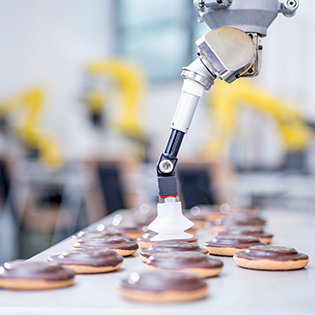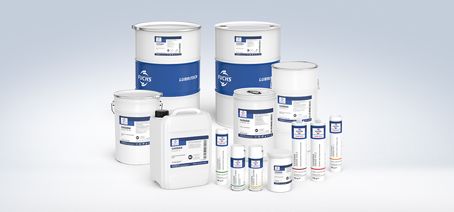Food grade lubricants
Approved lubricants and cleaners for all parts of the food and beverage industry

In the food and beverage industry, there are obviously very special requirements on the lubricants and cleaners that are used. In the manufacturing process, it can be hard to completely avoid contact with the products being made, which means the lubricants and cleaners must be absolutely safe to use.
Consumer safety is paramount, so hazardous contaminants simply must not occur – whether the lubricants are used in gear units, hydraulic systems or compressors. Some of the abbreviations often used are MOH, MOAH, MOSH and POSH. These are chemical compounds and animal content that foods may not contain – and that applies to every step of the process. Packaging materials (such as recycled cardboard) for example has proven to be a source of contamination in food production, as mineral hydrocarbons have been seen to migrate to the food.
What all this means is that if you need to use food grade lubricants and cleaners, you have to consider the entire chain, from manufacturing and processing to filling and packing. In broad terms, the more sensitive and demanding the process, the more important it is to use the correct approved products in the right place.
The FUCHS range contains complete product series for:
Not always straightforward
This is an industry that likes its abbreviations, so we have provided a short glossary below. If you’re not familiar with this world, we realise it can feel like something of a jungle – and you are of course always welcome to contact us if you need help understanding different standards and finding the right product.
The demands and expectations on food and beverage products being certified safe are constantly increasing, and penetrating ever further into the manufacturing stage. Today, for example, even cardboard and bottle manufacturers are expected to use products with the right labels and certificates, such as NSF and ISO 21469.
Industry organisation Global Food Safety Initiative (GFSI) recognises food standards such as BRCGS, FSSC 22000 and IFS. GFSI acts as an umbrella organisation that coordinates the requirements on safe standards, so that as consumers we can always rest assured that what we and our animals eat is safe. The actual certification – which ensures that food, animal feed and packaging materials are manufactured in line with prevailing standards – is carried out by each certification body.
The US National Sanitation Foundation (NSF) is a world leader in product certification for food safety, and is regarded as having the world’s strictest standards for food grade lubricants. They award their seal and codes to approved manufacturing plants and products included in the production of food and beverages. Each code reveals where in the production process a product should be used. It is therefore vital to be familiar with the different codes to guarantee the products are used in exactly the right place.
3H lubricants may come into direct and continuous contact with both foods and packaging materials, while H1 lubricants are only approved for incidental contact. Cleaners too (but not disinfectant fluids) are given codes that indicate where they should be used. An A1 cleaner, for instance, can be used as a general cleaner in a food zone, while an A4 product may only be used to clean the floor. There are also other codes which should not be used in food zones, such as H2 and K1.
The FUCHS product lines CASSIDA and RIVOLTA have been specially developed to meet the strictest safety standards of the food and beverage industry. Also, kosher and halal certificates ensure that the lubricants meet stringent cleanliness requirements for Jewish and Islamic dietary laws.
We make all our lubricants and cleaners in factories that are certified to ISO 21469. This also applies to sprays and single point lubricators, where FUCHS is one of very few companies entitled to use the strict ISO 21469 mark.
Each production unit has different operational environments and machinery, which means that we need to be able to provide a wide range of products including oils, greases, coolants and cleaners. Production of frozen foods, for example, requires special chain oils and greases that can withstand extremely low temperatures, while chains in a bakery will instead be exposed to temperatures up to 300°C. There are similar large differences in the butchery sector, for example, where the products need to be able to cope with salts, blood and fat. Breweries and juice manufacturers, on the other hand, need to ensure that the production environment can deal with high volumes of liquid and occasionally aggressive acids from fruit.
This kind of high-tech lubricant not only meets high safety standards, but also delivers the best technical performance. Taking the synthetic CASSIDA product line as an example, it has a life span three to four times that of a traditional mineral oil. Stability and durability are also exceptional at high temperatures, in the presence of water and under extreme pressure. The products can of course be used in other industries as well.
FUCHS works with BRCGS and also manufacturers of machines in the food and beverage industry, which guarantees that our customers use safe products.
Examples of certifications:

Do you need lubricants and cleaners for gear units, hydraulic systems, compressors or something else in food and beverage production? Whatever it is, we can guarantee that we have products for your machinery, and that we can help you navigate the seemingly complex world of food standards and NSF codes.
For the stricter certifications, our experienced engineers are here to help. They will examine your manufacturing processes and factory environment with you, and get back with suggestions for improvement in a detailed Lubrication Critical Control Point (or LCCP) report.
If you need to change lubricants or cleaners in your systems, FUCHS makes sure that the new products are compatible and miscible. We also share tools that will help you to change the fluids in your systems. We then highlight lubrication points and label bearings with the right product and colour code. After this, you naturally keep all the documentation, so that you carry on guaranteeing your ability to make food and beverages safely.
H1
H1 lubricants are used when no or only incidental contact with food is to be expected under normal operating conditions.
H2
H2 lubricants are used on equipment in the food production process where food contact can be completely excluded.
H3
H3 lubricants are used as corrosion protection, e.g. for knives and hooks. As with H2, the possibility of contact with and contamination of food must be completely excluded.
3H
3H lubricants are used when direct and continuous contact between the lubricant and food products is unavoidable.
Food Grade
Food Grade describes auxiliary and operating materials that are preferable to use in the food and beverage industry.
ISO 21469
An internationally valid standard that takes into account the hygiene requirements during the entire life cycle of an H1 lubricant, from formulation to production and application. The test procedure is carried out by the NSF and is considered the strictest certification for food grade lubricants worldwide.
Kosher
Lubricants that are kosher certified may be used in the production of foods that are produced in compliance with Jewish dietary laws.
Halal
Lubricants with halal certification may be used in the production of food in compliance with Islamic dietary laws.
EHEDG
The European Hygienic Engineering Design Group is a cooperation between machine manufacturers, the food industry, research institutes and authorities, which has the goal of promoting food safety through improvements in hygiene technology and planning in all areas of food production.
HACCP
A quality tool designed to check the production of food according to Hazard Analysis and Critical Control Points. This is intended to prevent consumers from becoming sick or injured in connection with food.
BRC
Global standard for food safety from the British Retail Consortium (BRC), according to which companies that handle and process food can be certified.
MOH
Mineral Oil Hydrocarbons.
MOAH
Mineral Oil Aromatic Hydrocarbons.
MOSH
Mineral Oil Saturated Hydrocarbons.
POSH
Polyolefin Oligomeric Saturated Hydrocarbons.
Need help?
Feel free to contact us, we are happy to help.

Mats Enmark
Key Account Manager Specialities
+46 70 725 84 14
mats.enmark@fuchs.com

